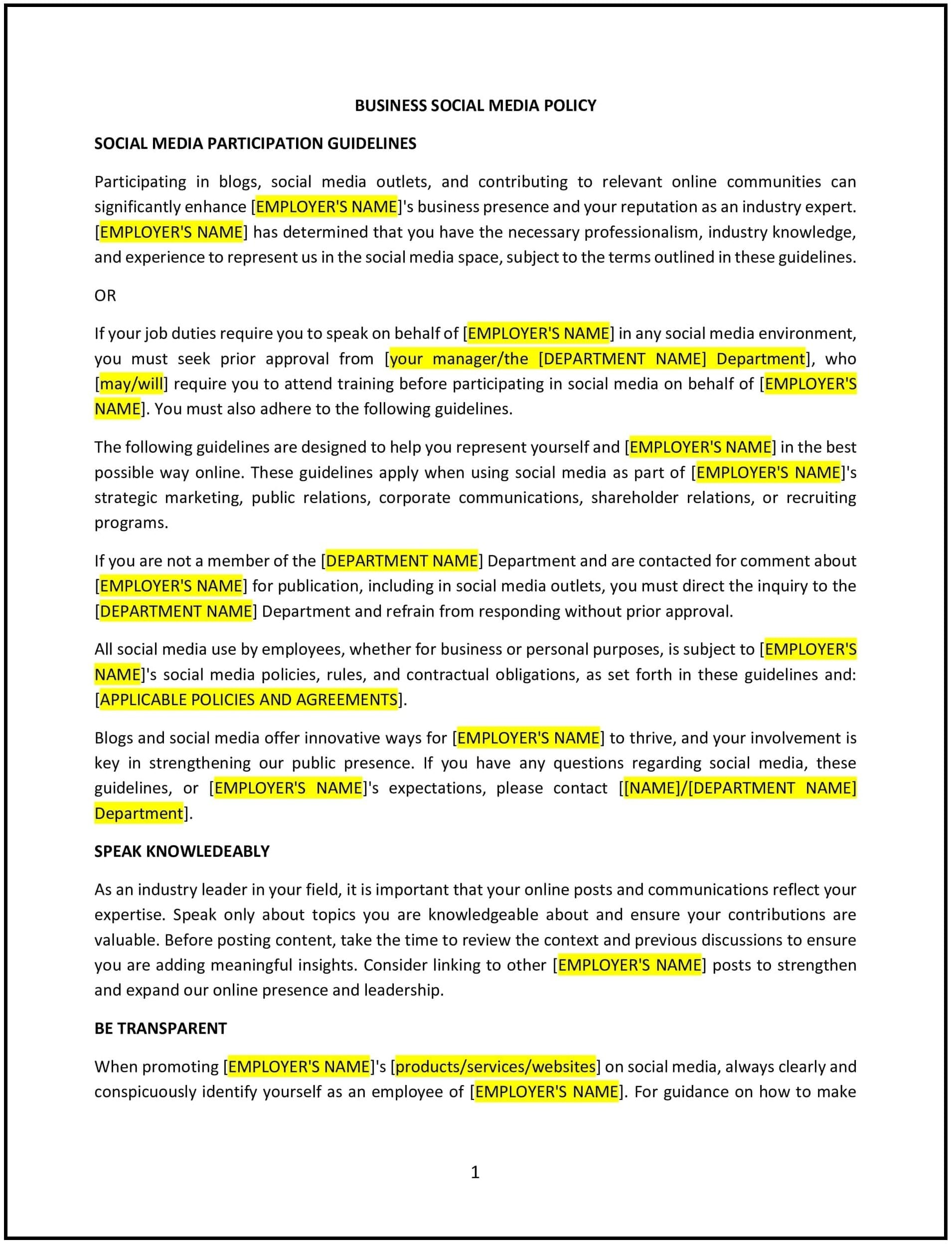Business social media policy (West Virginia): Free template
Got contracts to review? While you're here for policies, let Cobrief make contract review effortless—start your free review now.

Customize this template for free
Business social media policy (West Virginia)
A business social media policy helps West Virginia businesses establish guidelines for employees’ use of social media in a professional context, whether on the company’s behalf or as private individuals. This policy outlines the expectations for appropriate behavior, confidentiality, and the responsible use of social media platforms, ensuring that employees represent the company in a positive manner while maintaining compliance with legal and ethical standards.
By implementing this policy, businesses can protect their brand reputation, mitigate legal risks, and foster a respectful online environment for both employees and the public.
How to use this business social media policy (West Virginia)
- Define social media use: Clearly outline what constitutes social media use, including platforms such as Facebook, Twitter, LinkedIn, Instagram, blogs, forums, and any other online tools that allow individuals to share content publicly.
- Set guidelines for professional use: Provide employees with guidelines for using social media on behalf of the company, such as speaking on company issues, responding to customer inquiries, or sharing company news. Specify who is authorized to post on official company accounts.
- Address personal use: Specify the expectations for personal social media use, including whether employees are allowed to discuss work-related matters online, comment on the company’s activities, or share content that reflects on the company.
- Maintain confidentiality: Remind employees not to disclose confidential business information, trade secrets, or sensitive data on social media platforms. Establish guidelines for handling private customer or company information appropriately.
- Prohibit discrimination and harassment: Establish clear boundaries for employees to avoid discriminatory or harassing behavior online, ensuring that employees’ personal social media activity does not reflect negatively on the business.
- Provide guidance on comments and interactions: Set expectations for professional conduct when employees engage with customers, clients, or other stakeholders on social media platforms, including respectful language and tone.
- Outline disciplinary actions: Specify the consequences for violating the policy, such as disciplinary action, suspension, or termination, depending on the severity of the misconduct.
Benefits of using this business social media policy (West Virginia)
This policy offers several benefits for West Virginia businesses:
- Protects company reputation: Establishes clear guidelines for how employees should represent the company online, helping to prevent damaging posts or negative perceptions.
- Reduces legal risks: By maintaining a professional and respectful online presence, businesses can reduce the risk of lawsuits related to harassment, discrimination, or breaches of confidentiality.
- Ensures consistency: A clear social media policy ensures that employees understand their responsibilities and act consistently when representing the company online.
- Enhances brand management: By setting guidelines for official company accounts and posts, businesses can ensure that their social media presence aligns with their branding and business goals.
- Promotes responsible use: Encourages employees to use social media responsibly, ensuring their personal posts do not negatively impact their work or the company.
Tips for using this business social media policy (West Virginia)
- Communicate the policy clearly: Ensure that all employees understand the guidelines for both personal and professional social media use, including expectations for behavior and consequences for violations.
- Provide training: Offer training sessions on social media best practices, focusing on maintaining professionalism, protecting confidentiality, and managing online interactions.
- Monitor online presence: Periodically review social media accounts associated with the business and ensure that employees are following the policy guidelines and maintaining a positive online image.
- Encourage positive engagement: Promote the use of social media for constructive and engaging purposes, such as sharing industry insights, company updates, and connecting with customers in a meaningful way.
- Review periodically: Update the policy as needed to reflect changes in social media trends, West Virginia laws, or company practices to ensure it remains effective and relevant.